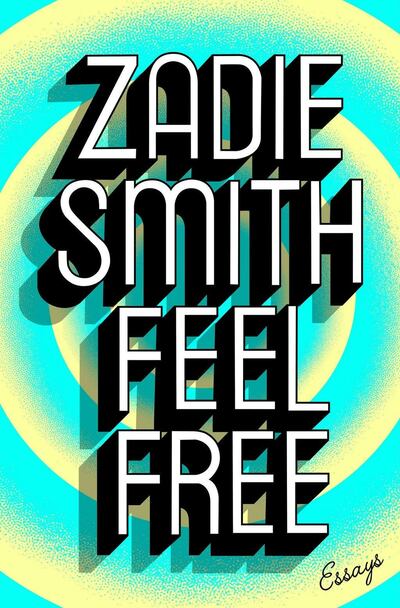Zadie Smith's first book of non-fiction, Changing My Mind (2009), was a collection of so-called "occasional essays" – a playful twist on occasional poetry or poetry commissioned and composed for a specific occasion. But intentionally or not, the other meaning of "occasional" also applied to those essays. They were, for the most part, irregular writings, side projects and stop-gap pieces penned during the seven-year lull between the novels On Beauty and NW.
The day job was still fiction, but now and again Smith would surprise, and impress, with a short, incisive extracurricular offering.
That was then. Since that collection Smith has upped her non-fiction output – so much so that to refer to her merely as a novelist is to sell her short. Feel Free, her second collection of essays, is thicker and longer than Changing My Mind, packing in as it does many meaty pieces for The New York Review of Books and the columns Smith wrote for Harper's Bazaar. There is nothing "occasional" about its contents. This time we get simply "essays" – more varied than before and a lot more assured.
Smith begins with a disclaimer of sorts. These essays were written during the eight years of the Obama administration and as such are “the product of a bygone world”. But this is too harsh. There are no period pieces to be found here, nor a supply of quaint ideas and outmoded beliefs. Granted, the books and films under scrutiny are no longer new releases, but Smith’s assessments remain fresh and valid. Some hot-potato topics show no sign of cooling and the array of personal recollections, private concerns and cultural commentaries are built to last.
The book is divided into five discrete sections. The first, “In the World”, has Smith wrestling with matters political, social and even meteorological. In “North-west London Blues” she returns to her old stomping ground in Willesden and despairs at council plans to demolish the local library and an independent bookshop to make space for luxury flats.
What could have been a soapbox rant is instead an impassioned plea to preserve ever-diminishing reading spaces and also a nostalgic hark-back to a happy time: Smith hung out with school friends in the library and had her first book launch in the bookshop.
“Fences: A Brexit Diary” also starts out with a homecoming and an evaluation of north-west London urban development (“around here change is the rule”). It then expands into a scathing yet focused state-of-the-nation analysis, a blend of inquiry and inquest that shines a light on Britain’s current crop of political villains and the chaos they have unleashed.
A referendum, Smith argues, “turns out to be a very ineffective hammer for a thousand crooked nails”.
In the second section, "In the Audience", Smith switches from helpless onlooker to engaged observer, or listener. "Generation Why?" is another springboard piece, in which an in-depth review of the film The Social Network leads to an examination – and later excoriation – of Facebook. A different kind of jump is at work in "Some Notes on Attunement". Here Smith describes the "leap of faith" she took, transporting her from "Joni Mitchell-hating pilgrim" to a full-on aficionado who today can't listen to Mitchell without crying uncontrollable tears of joy.
_________________
Read more:
International Prize for Arabic Fiction: The six finalists shortlisted for the 'Arabic Booker'
‘Frankenstein In Baghdad' to be released in English: we speak to Ahmed Saadawi
Syrian author Khaled Khalifa on Aleppo: 'There is a resilience in the city'
_________________
In her section "In the Gallery", Smith comes clean and concedes that she is a laywoman when it comes to visual art, only "a casual appreciator of painting". Fortunately, her aesthetic responses and judgments are considered and astute – more like Katie's subtle thoughts than Howard's lofty pronouncements in Smith's art-infused On Beauty (2005).
Smith explains on more than one occasion that, despite possessing pockets of knowledge here and there, she really has only one area of expertise – the novel. Unsurprisingly, then, it is in the section “On the Bookshelf” that she is at her most confident, persuasive and entertaining. Book introductions, reviews and lectures are comprised of rigorous study and illuminating meditations, anecdotes and reminiscences, wit and warmth.
The weaker essays in this collection are those that show Smith either underperforming or trying too hard. In “Elegy for a Country’s Seasons” she bewails the ongoing disaster of climate change and the head-in-the-sand attitude of
its deniers, but offers no solution to stem the tide or alter mindsets.
An interview with Jay-Z is a puff piece that borders on hagiography. A profile of Justin Bieber, which compares and contrasts the global pop star with the philosopher Martin Buber, is an exercise in all-out preposterousness and pretentiousness.

However, these constitute rare weak spots. Smith hits far more often than she misses, particularly when she swaps head for heart or opinions for experiences and touches on family, home and what makes her happy. In an excellent and thoroughly original essay on Billie Holiday that unfolds in the second person, Smith eschews a stiffly prescriptive approach and instead triumphantly pulls off "some form of ventriloquy".
The book’s final, eponymous and miscellaneous section takes her away from editorial constraints and allows her to exercise creative freedom with a variety of diverse topics such as death (and life squandered on an iPhone), diaries, travels with her father, two years spent in Italy, and what she calls “the retrospective swirl”.
Not every acclaimed novelist is also an accomplished essayist. But Feel Free is proof that Smith's literary talents are not confined to fiction. This admirable collection expertly showcases her way with words, her critical faculties, and her dogged pursuit of truth.


